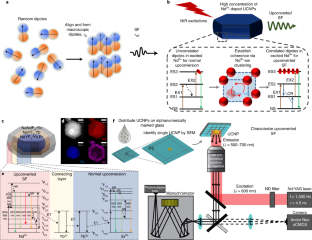2022-08-29 ノースカロライナ州立大学(NCState)
今回、研究チームが合成した材料は、ランタノイドをドープしたアップコンバージョンナノ粒子(UCNP)で、「より明るい」光学材料を作製することを目指したものである。
研究チームが合成した材料は、ランタノイドをドープしたアップコンバージョンナノ粒子(UCNP)で、「より明るい」光学材料を作製することを目指したものである。研究チームは、50ナノメートルから500ナノメートルの大きさの六角形のセラミック結晶を作製し、その発光特性のテストを開始した。
当初、研究者たちは、ある原子から発せられた光が、別の原子を刺激して同じ光をさらに発しさせるという、レーシング現象を探した。しかし、その代わりに、まずすべての原子が整列して発光する超蛍光を発見した。
この物質を異なるレーザー強度で励起すると、励起ごとに、一定の間隔で3つのパルス状の超蛍光を発することがわかった。しかも、各パルスは2ナノ秒の長さで、劣化することはありません。つまり、UCNPは室温で超蛍光を示すだけでなく、それを制御できる方法で示す。
<関連情報>
- https://news.ncsu.edu/2022/08/naturally-insulating-material-emits-pulses-of-superfluorescent-light-at-room-temperature/
- https://www.nature.com/articles/s41566-022-01060-5
室温アップコンバート超蛍光 Room-temperature upconverted superfluorescence
Kai Huang,Kory Kevin Green,Ling Huang,Hans Hallen,Gang Han & Shuang Fang Lim
Nature Photonics Published29 August 2022
DOIhttps://doi.org/10.1038/s41566-022-01060-5

Abstract
Superfluorescence (SF) is a unique quantum optics phenomenon arising from the assembly of self-organized and cooperatively coupled emitters. SF produces a short and intense burst of light, ideal for various applications in nanophotonics and optical computing. However, due to the prerequisite for cooperative emitter coupling, SF was conventionally observed in a Stokes-shifted manner under cryogenic conditions in limited systems (for example, atomic gases and perovskite-nanocrystal superlattices). Here we show that room-temperature anti-Stokes-shift SF is achieved in a few randomly assembled or in a single lanthanide-doped upconversion nanoparticle. Moreover, upconverted SF has a 10,000-fold accelerated nanosecond lifetime (τ = 46 ns of SF versus τ = 455.8 μs for normal upconversion luminescence), overcoming the slow decay of conventional upconversion systems. Therefore, the conceptual room-temperature anti-Stokes-shift SF not only lays the foundation for ultrafast upconversion but it also paves a straightforward way to a wide variety of applications that have been limited by the existing SF system.


